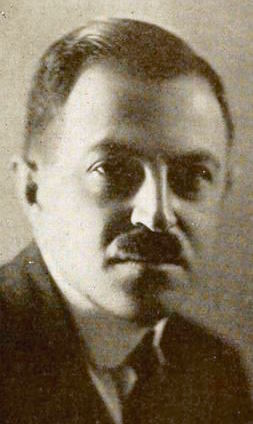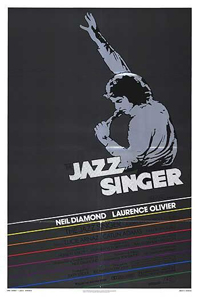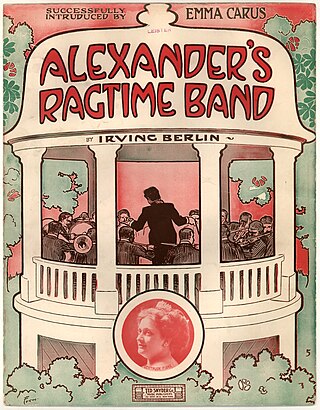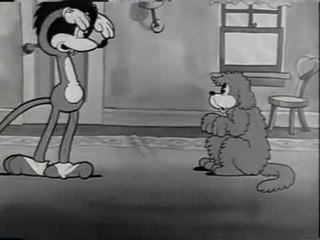
The golden age of American animation was a period in the history of U.S. animation that began with the popularization of sound synchronized cartoons in 1928 and gradually ended in the 1960s when theatrical animated shorts started to lose popularity to the newer medium of television. Animated media from after the golden age, especially on television, were produced on cheaper budgets and with more limited techniques between the late 1950s and 1980s.

Fleischer Studios was an American animation studio founded in 1929 by brothers Max and Dave Fleischer, who ran the pioneering company from its inception until its acquisition by Paramount Pictures, the parent company and the distributor of its films. In its prime, Fleischer Studios was a premier producer of animated cartoons for theaters, with Walt Disney Productions being its chief competitor in the 1930s.

Max Fleischer was a Polish-American animator and studio owner. Born in Kraków, Poland, Fleischer immigrated to the United States where he became a pioneer in the development of the animated cartoon and served as the head of Fleischer Studios, which he co-founded with his younger brother Dave. He brought such comic characters as Koko the Clown, Betty Boop, Popeye, and Superman to the movie screen, and was responsible for several technological innovations, including the rotoscope, the "follow the bouncing ball" technique pioneered in the Ko-Ko Song Car-Tunes films, and the "stereoptical process". Film director Richard Fleischer was his son.

Betty Boop is an animated cartoon character designed by Grim Natwick at the request of Dave Fleischer. She originally appeared in the Talkartoon and Betty Boop film series, which were produced by Fleischer Studios and released by Paramount Pictures. She was featured in 90 theatrical cartoons between 1930 and 1939. She has also been featured in comic strips and mass merchandising.

Talkartoons is a series of 42 animated cartoons produced by Fleischer Studios and distributed by Paramount Pictures from 1929 to 1932.

Rotoscoping is an animation technique that animators use to trace over motion picture footage, frame by frame, to produce realistic action. Originally, live-action film images were projected onto a glass panel and traced onto paper. This projection equipment is referred to as a rotoscope, developed by Polish-American animator Max Fleischer. This device was eventually replaced by computers, but the process is still called rotoscoping.

The Fleischer Superman cartoons are a series of seventeen animated superhero short films released in Technicolor by Paramount Pictures and based upon the comic book character Superman, making them his first animated appearance.

Brenda Song is an American actress. Born in California, Song began her career at the age of six, working as a child model. She made her screen debut with a guest appearance on the sitcom Thunder Alley (1995), and went on to roles such as the children's television series Fudge (1995) and the Nickelodeon series 100 Deeds for Eddie McDowd (1999). She starred in the Disney Channel original film The Ultimate Christmas Present (2000), which won her a Young Artist Award. She subsequently signed a contract with Disney Channel and earned widespread recognition for playing the titular character in the action film Wendy Wu: Homecoming Warrior (2006), and London Tipton in the comedy franchise The Suite Life (2005–2011), earning her acclaim and two Young Hollywood Awards. She additionally played the character of Tia on Phil of the Future (2004–2005), and had starring roles in the television film Get a Clue (2002), the sports comedy film Like Mike (2002) and the comedy film Stuck in the Suburbs (2004).

The Jazz Singer is a 1980 American musical drama film directed by Richard Fleischer and produced by Jerry Leider. The film stars Neil Diamond, Laurence Olivier and Lucie Arnaz, and tells the story of a young singer who is torn between tradition and pursuing his dreams as a pop singer. Based on the 1925 play of the same name by Samson Raphaelson, it is the fourth film adaptation, following the 1927 and the 1952 theatrical adaptions, and a 1959 television adaptation.

Screen Gems is an American film production company owned by Sony Pictures Entertainment, a subsidiary of Japanese multinational conglomerate, Sony Group Corporation. The Screen Gems brand has served several different purposes for its parent companies over the decades since its incorporation, initially as a cartoon studio, then a television studio, and later on as a film studio. The label currently serves as a film production that specializes in genre films, mainly horror.

North to Alaska is a 1960 American comedy Western/Northern film directed by Henry Hathaway and John Wayne (uncredited). The picture stars Wayne along with Stewart Granger, Ernie Kovacs, Fabian, and Capucine. The script is based on the 1939 play Birthday Gift by Ladislas Fodor and is set during the Nome gold rush.

Screen Songs are a series of animated cartoons produced at the Fleischer Studios and distributed by Paramount Pictures between 1929 and 1938. Paramount brought back the sing-along cartoons in 1945, now in color, and released them regularly through 1951. Two of Paramount's one-shot cartoons quietly revived the format later: Candy Cabaret (1954) and Hobo's Holiday (1963).
Samuel Timberg was an American musician and composer for the stage, film studios, and television.

The bouncing ball is a virtual device used in motion picture films and video recordings to visually indicate the rhythm of a song, helping audiences to sing along with live or prerecorded music. As the song's lyrics are displayed on the screen in a lower third of projected or character-generated text, an animated ball bounces across the top of the words, landing on each syllable when it is to be sung.

Gulliver's Travels is a 1939 American animated musical fantasy film produced by Max Fleischer and directed by Dave Fleischer for Fleischer Studios. Released to cinemas in the United States on December 22, 1939, by Paramount Pictures, the story is a very loose adaptation of Jonathan Swift's 1726 novel of the same name, specifically only the first part of four, which tells the story of Lilliput and Blefuscu, and centers around an explorer who helps a small kingdom who declared war after an argument over a wedding song. The film was Fleischer Studios' first feature-length animated film, as well as the second animated feature film produced by an American studio after Walt Disney Productions' Snow White and the Seven Dwarfs, as Paramount had commissioned the feature in response to the success of that film. The sequences for the film were directed by Seymour Kneitel, Willard Bowsky, Tom Palmer, Grim Natwick, William Henning, Roland Crandall, Thomas Johnson, Robert Leffingwell, Frank Kelling, Winfield Hoskins, and Orestes Calpini.
Ko-Ko Song Car-Tunes, Song Car-Tunes, or Sound Car-Tunes, is a series of short three-minute animated films produced by Max Fleischer and Dave Fleischer between May 1924 and September 1927, pioneering the use of the "Follow the Bouncing Ball" device used to lead audiences in theater sing-alongs. The Song Car-Tunes also pioneered the application of sound film to animation.
Herbert Baker was a songwriter and screenwriter for television and films.

Zombieland is a 2009 American post-apocalyptic zombie comedy film directed by Ruben Fleischer and written by Rhett Reese and Paul Wernick. It stars Woody Harrelson, Jesse Eisenberg, Emma Stone, Abigail Breslin, and Bill Murray. In the film, Tallahassee (Harrelson), Columbus (Eisenberg), Wichita (Stone), and Little Rock (Breslin) make their way on an extended cross-country road trip to find a sanctuary free from zombies.
Earl Felton (1909–1972) was an American screenwriter.

Venom is a 2018 American superhero film based on the Marvel Comics character of the same name. The first film in Sony's Spider-Man Universe (SSU), it was directed by Ruben Fleischer from a screenplay by Jeff Pinkner, Scott Rosenberg and Kelly Marcel, and stars Tom Hardy as Eddie Brock and Venom, alongside Michelle Williams, Riz Ahmed, Scott Haze, and Reid Scott. In the film, Eddie, a struggling journalist, gains superpowers after becoming the host of Venom, an alien symbiote whose species plans to invade Earth.














